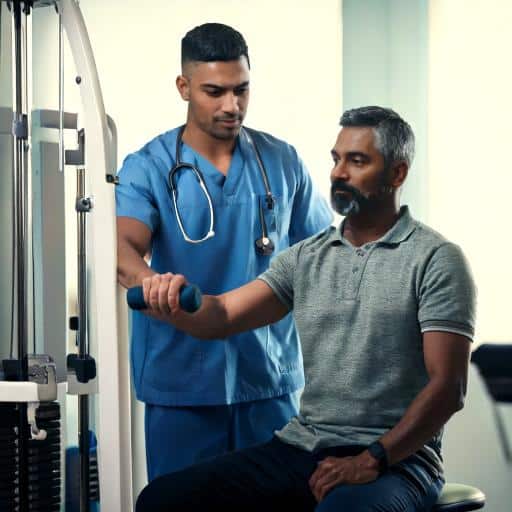Clinical Exercise Physiology: A Rising Practice

What is a Clinical Exercise Physiologist?
A Clinical Exercise Physiologist or CEP is a healthcare professional that works to improve and manage various sub-acute or chronic health-related conditions by using a range of exercise tools. These conditions can include muscle and bone injuries, neurological conditions and even cardiovascular and metabolic issues such as cancer. It employs a comprehensive exercise intervention method that treats a patient on a holistic level rather than as a sum of their parts.
What does a CEP do?
Backed by the knowledge and experience gained by a 4-year intensive degree course, a CEP is equipped to assess an individual’s entire medical history. This includes but is not limited to assessing their prescribed medications, diagnosed health conditions such as blood pressure or blood glucose and analysing movement patterns and sport-specific physical assessments.
This complete assessment is what enables them to create individual evidence-based exercise programs, aimed at generating positive outcomes and fostering health education. The data garnered via a thorough analysis of a patient’s medical history and past physical activity, allows a CEP to collate an exercise regimen and strategize methods by which they can bring about the desired lifestyle changes.
The uniqueness of this profession lies in the understanding that it is not merely a matter of creating an exercise program, as treatment isn’t brought about by just exercise; it’s about doing the right kind of exercise.
By tailoring exercise programs that are specific to an individual’s condition, lifestyle, body type, movement patterns and medications, CEPs aim to add sustainable physical activity to an individual’s daily life. This drives client motivation, promotes lifestyle improvement and helps people manage their own conditions, ultimately allowing them to take control of their own health.
Some specific conditions CEPs can help with:
Clinical Exercise Physiologists help in managing and improving a number of medical difficulties, such as:
- Neurological Conditions such as Parkinson’s, Cerebral Palsy, Polyneuropathy, Autism, ADHD: Clinical Exercise Physiologists help assess, manage and improve physical ability and issues such as gait, proprioception and neuromuscular firing.
- Muscle and bone injuries: In these cases, Clinical Exercise Physiologists can help with rehabilitation and the ability to resume sports and live painlessly post injury. After conducting an analysis of a patient’s movement patterns they are able to determine the possible cause of injury or pain and then strategise a program to help clients get back to their daily sport or exercise. They can also help elite athletes by assessing their performance, preventing further injury and developing training programs tailored to the sport to generate the most efficient performance outcomes.
- People undergoing Cancer treatment: They can also benefit from the advice of CEPs since exercise is linked to reducing side effects from harsher treatments such as Chemotherapy, Immunotherapy and Radiation. Tailored exercise is also known to reduce risk of recurrence of cancer and can drastically help with cancer recovery
- Mental Health Issues: Statistically, exercise has been proven to boost “feel good” hormones and reduce one’s reliance on medication which is especially useful for people struggling with mental health issues.

What is the difference between a CEP and a Physiotherapist?
Working with other health professionals, such as physiotherapists, occupational therapists, sports coaches, GPs and psychologists, is a large component of what a CEP’s role entails. And while on the face of it, the work a CEP does may seem similar to that of a physiotherapist, the two professions have a few main points of distinction such as:
- Treatment Methodology: As mentioned previously, CEPs treat medical conditions by first conducting thorough assessments of a patient’s medical history and then customising a holistic exercise intervention program. On the other hand, physiotherapists employ more hands-on methods such as massages, cupping, needling and a few exercise techniques to assess, diagnose and treat injuries. Their focus is more on therapeutic management such as medication or muscle manipulations to help alleviate pain.
- Stages of Intervention: Physiotherapists are considered the “first contact” professionals when it comes to treatment as CEPs cannot diagnose conditions. Therefore, they’re the second points-of-contact, usually referred to by GPs or Physiotherapists, once the diagnosis and preliminary stages of treatment have been conducted.
- Range of Treatment: Clinical Exercise Physiologists are equipped to assess and treat a wider range of conditions as compared to physiotherapists.
CEP- A Rising Practice:
Healthcare clinics that employ Clinical Exercise Physiologists are reported to have boosted clinic productivity, improved health outcomes for clients and overall, reduced clinical expenditure. Most importantly, it is a practice that makes rehabilitation more accessible to people, improves their quality of life and helps them manage diseases and other ailments better.
In India, the profession of a Clinical Exercise Physiologist is still uncommon due to the fact that awareness and education about the practice is relatively low and physiotherapists currently occupy the larger market share of exercise-driven treatment for medical conditions. However, Moushu’s Pilates clinics in Mumbai offer clinical exercise physiology services and specialise in working with people suffering from neurological conditions such as Parkinson’s, Fibromyalgia, Autism and ADHD. We also work with elite athletes, people with muscle and bone injuries and a wide range of women’s health issues like diastasis recti.
While India may be behind the curve in adopting Clinical Exercise Physiology, countries like Australia and the UK have already recognised its significance and have slowly begun adopting the practice into their organised healthcare sectors over the last 20 years.
At Moushu’s Pilates, we’re embracing the tremendous potential the field holds. We’re ready to reshape the landscape of healthcare in India, one exercise at a time.
Author: Aaliyah Kuvawala
Having graduated from the University of Queensland, she is now a Clinical Exercise Physiologist who’s been practising pilates for 8 years and is a certified Matwork and Equipment instructor from APPI (UK). She specialises in exercise rehab for elite athletes, people with muscle bone injuries, neurological issues like Parkinson’s and women’s health conditions.
